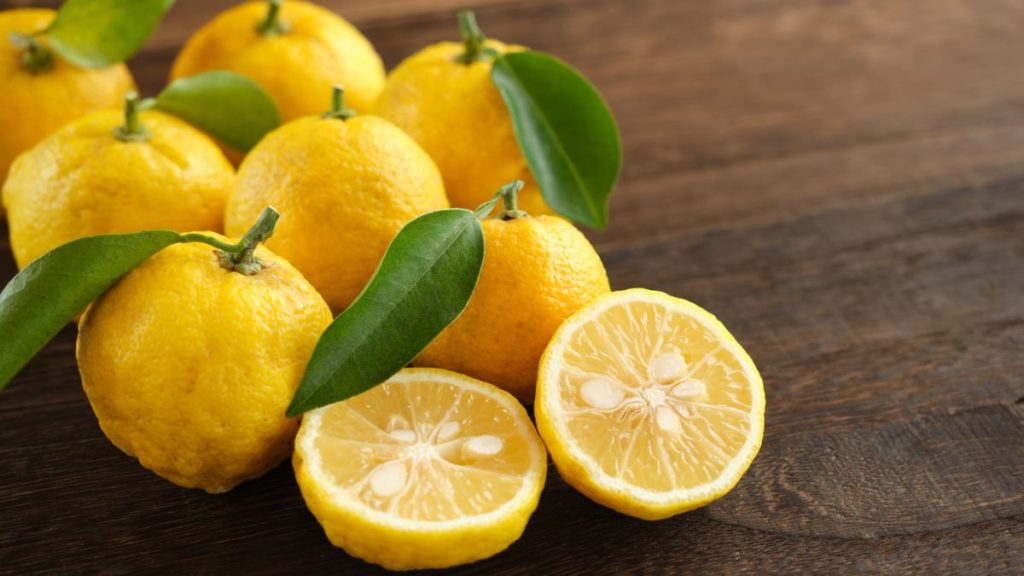Yuzu is the combination of a little mandarin orange and a lemon-like citrus fruit. It turns green to orange-yellow as it ripens, and its skin is loose and slightly wrinkled. The juice and zest of yuzu are used to flavor alcohol, add flavor to cream for desserts, and make marmalade or jam. Most of the time, this low-acid citrus is used in Japanese food, but it is also popular in Korea and China. Over the years, yuzu has become a popular ingredient in American cocktails. Its tart juice and robust, pleasant floral smell make it a favorite. Yuzu is sold not only as a whole fruit but also as juice in bottles and candied peel. To know if are there health benefits to eating Yuzu Fruit, read further.
What is Yuzu?
Yuzu is a citrus fruit grown in Asia, and it is thought that it was first produced in China and Tibet. It crosses a mandarin orange and a Yichang papeda, a complex, green, oval citrus fruit native to the area. Most yuzu is still grown in Asia, but small-scale plantings of this fruit have begun in other parts of the world.
Unlike other citrus plants, this one grows on bushes with sharp thorns, making picking hard, so this fruit costs more than similar ingredients. Most mature yuzu fruits are about the size of a tiny fist, but some have grown as big as a softball or a large grapefruit.
Yuzu is the most popular fruit grown for sale in Japan that is sour. Many think yuzu is a cross between a mandarin orange and a less well-known citrus fruit called papeda. Yuzu looks like a small orange with bumps. It is sometimes called Japanese citron, and its robust taste has made it a popular ingredient in many dishes.
In China, where he was looking for new plant species for the U.S. Department of Agriculture, plant expert Frank N. Meyer found the yuzu in 1914. (USDA). Most of the time, it is used in Japanese cooking these days. Early Japanese settlers brought yuzu to California, which made it the biggest producer in the U.S. Plant diseases make it so that neither the plant nor the fruit can be brought into the United States.
Are there Health Benefits to Eating Yuzu Fruit?
Citrus fruits are good for your health, but yuzu may not be mentioned because it is not as expected. Yuzu fruit has all the benefits of citrus fruits, plus the following:
Reduced Risk of Gout
The vitamin C in yuzu fruit could stop a painful gout attack. A gout is a form of arthritis caused by too much uric acid in the joints. Vitamin C makes you get rid of more uric acid, so there is less of it in your blood. You can take a supplement to get more vitamin C, but one serving of yuzu will give you most of what you need for the day. But no studies have shown that vitamin C can certainly stop gout attacks.
Eye Health
Age-related macular degeneration (AMD), a common cause of vision loss, may be slowed by the vitamin C and other nutrients in yuzu fruit. You can take a vitamin C supplement, but eye doctors recommend eating a lot of leafy greens, red and yellow vegetables, and fruits, like yuzu, to get enough vitamin C.
Disease Prevention
The yuzu fruit contains antioxidants, which can stop cell damage and lead to diseases like heart disease and cancer. Scientists have found a link between not getting sick and eating a lot of antioxidants.
Improved Blood Flow
Hesperidin and naringin, found in yuzu fruit, can stop platelets, colourless blood cells that help prevent blood clots from sticking to the inside blood vessels. This action against platelets can prevent blood from clotting and keep blood vessels from getting inflamed.
Aspirin and other drugs are sometimes given to thin the blood, but they don’t always work and can have side effects. Some scientists want to find plant-based medicines that work like these. Talk to your doctor before changing your treatment if you take aspirin or other drugs for your heart.
Stress Relief
The smell of yuzu fruit could be an excellent way to relieve stress. In a study with female college students, yuzu essential oil made from the fruit made the women feel better. Researchers proved this by looking at a substance in saliva that goes up when someone is stressed.
What are the Varieties of Yuzu?
There are different kinds of yuzu, but in the U.S., you will only find the most common one. The hand yuzu is a decorative type of citrus grown for its sweet-smelling flowers but not for its zest or juice. Yuko is a type of yuzu that can only be grown in Japan, and it is rare and was on the verge of extinction in the 1970s. The yuzu with bumpy skin is called lion or shishi yuzu. It tastes similar to the expected fruit. The dangyuja, a pomelo grown in Korea, is often taken for yuzu.
How to Use Yuzu?
Yuzu is used for its juice and zest, but it shouldn’t be eaten whole. Its tartness is similar to lemon but less acidic, and some say it’s even more vital. Before adding the fruit to a recipe, you must juice or zest it. Use yuzu best in a sauce, as a seasoning, or as a part of a cocktail. The sourness can also be tamed with sugar. Truffles, ice cream, and pie all use yuzu juice, and the peel can be candied and used as a sweet garnish.
Yuzu has a strong, sour taste that goes well with alcoholic drinks. Unlike its related citrus fruits, yuzu juice can stand on its own in these drinks. I, and gives them a bright flavour usually lost in the liquor. Try it in a whiskey highball, a gimlet, or a classic sour. You can also use yuzu instead of lemon or lime to change these drinks.
This citrus can also be used in food. Yuzu goes well in a simple salad dressing or on roasted vegetables. It can also be zested and added to baked goods, sprinkled on smoked salmon, or used to decorate grilled chicken. Japanese people traditionally make ponzu sauce with yuzu, rice wine, vinegar, and soy sauce. It is often served with dumplings and marinated meat and can be used as a seasoning while cooking.
What does it Taste Like?
Yuzu tastes like a mandarin orange but has a strong tart bite that tastes like a lemon. Because it’s so sour, eating in segments like a regular orange is not great. Instead, chefs and bartenders use the rind and the juice from the flesh. Despite being sour, yuzu has a delicate taste because it has a floral undertone. This is similar to how grapefruit and lime juices taste when mixed.
Yuzu is very sour and tastes like a mix of a lemon’s tartness, grapefruit’s bitterness, and an orange’s sweetness. It has a tart taste backed up by hints of floral and herbal flavors. Compared to other citrus fruits, yuzu has a strong smell, and when it’s ripe, it smells like a mix of honeysuckle and citrus.
Yuzu Recipes
In many recipes, yuzu can be used instead of lemon and sometimes orange juice, even though it’s much sourer (but not in a one-to-one ratio). So, yuzu can be used in many different ways, like in sauces and drinks and to add flavour to meat and fish.
How Long does Yuzu Stay Good for?
Yuzu fruits can be kept at room temperature, but if you’re not going to use them right away, you can put them in the fridge to make them last longer. Even though yuzu can stay fresh for a few weeks in the refrigerator, the fruit may lose its strong smell after a few days. To make the fruit last even longer, you can freeze yuzus whole or freeze the peel, flesh, and juice separately. The skin and flesh of a yuzu can be frozen for up to one month, while the juice can stay fresh for about six months.
If you like bottled yuzu condiments, like this Yuzu Hot Sauce from Trader Joe’s, they will stay fresh in the fridge for several weeks, if not longer. To be safe, check the sell-by date and give it a sniff.
Where to Buy Yuzu?
Some yuzu is grown and picked in California, and other citrus farms may have tried growing it. However, most yuzu comes from Asia, so it can be hard to find fresh yuzu. If you want fresh yuzu, look for it between September and November.
The best places to look are Asian markets and specialty stores that import the fruit. Finding yuzu juice in a bottle and frozen zest might be more accessible, especially if you shop online. Yuzu might not be easy to find at your regular grocery store, but you should watch it at your local Asian grocery store. So, if you look for it carefully at the right time of year, you might find it.
Storage
Keep fresh yuzu in the pantry in a cool, dark place. If the fruit is still green, you can put it on the counter or in a paper bag to let it ripen (which will be faster). You can freeze or put bottled yuzu juice in the fridge to keep it fresh for at least a few months. However, fresh juice tastes best when it’s used right away. Zest that has been frozen can be used as needed for up to a year. If the spice is fresh, use it right away. It will dry out in a couple of days if you don’t. You can also use the dried zest, but the taste won’t be as strong.
Conclusion
Yuzu is a citrus fruit that is both sweet and sour. It comes from China or Korea but is most often used in Japanese food. Yuzu is a hybrid citrus fruit cross between the Ichang papeda and sour mandarin orange. It is also called a Japanese citron or Yuja in Korean. So, It looks like a tangerine and is about the same size, but the skin is thick and bumpy. Yuzu has a green peel that turns warm yellow when it’s ready. The inside of the fruit is yellow and has a lot of seeds, so it doesn’t have as much juice as a lemon or lime. Because of this and how hard it is to pick, yuzu is more expensive than other kinds of citrus.


